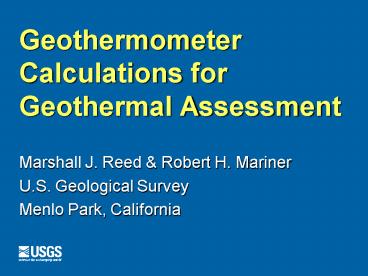Geothermometer Calculations for Geothermal Assessment - PowerPoint PPT Presentation
1 / 9
Title:
Geothermometer Calculations for Geothermal Assessment
Description:
The Total Equivalent Concentration (in mEq/L) of all. Cations = S cations, and the Total Concentration of all. Anions = S anions ... – PowerPoint PPT presentation
Number of Views:342
Avg rating:3.0/5.0
Title: Geothermometer Calculations for Geothermal Assessment
1
Geothermometer Calculations for Geothermal
Assessment
- Marshall J. Reed Robert H. Mariner
- U.S. Geological Survey
- Menlo Park, California
2
Geothermal Resource Assessment
The Quantitative Estimate of Thermal Energy in a
Geothermal Reservoir Depends on a Knowledge of
Volume, Temperature, Density Heat Capacity
3
Geothermal Reservoir Temperature
The Temperature of a Geothermal Reservoir can be
Measured Directly or it can be Estimated by
Chemical Geothermometer Calculations Based on
Water Chemistry
4
Silica Solubility as a Function of Temperature
Quartz green Chalcedony red Giggenbach
blue approximation
5
Cation Geothermometers
- Based on Mineral Reactions as a Function of
Temperature - Geothermometers were Calibrated from Chemical
Analyses of Water at Known Temperatures in Wells - Geothermometers were Calibrated with Dilute,
Sodium-Chloride Type Waters at Near-Neutral pH - Differences in Chemistry between Calibration
Waters and New Geothermal Systems Requires Extra
Caution in Application of Geothermometers - Injection from Power Plant Operations will
Disrupt and Reset Geothermometers
6
Temperatures Calculated with Na-K-Ca-Mg
Geothermometer
Systems listed in USGS Circ. 790
7
Temperatures Calculated with K-Mg Geothermometer
Systems listed in USGS Circ. 790
8
Check of Analytical Reliability
- Each Ion in the Chemical Analysis is Converted to
its - Equivalent Concentration using the Equation
- (analytical concentration)
- Equivalent Concentration
- (mol. wt.) (ionic charge)
- Example for Ca
- (100 mg/L)
- 4.99 mEq/L
- (40.08 g/mol) (2 equivalents/mol)
9
Check of Analytical Reliability
- The Total Equivalent Concentration (in mEq/L) of
all - Cations S cations, and the Total Concentration
of all - Anions S anions
- 100 S cations - S anions
- Charge Balance Error ()
- 0.5 (S cations S anions)































